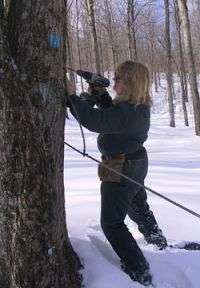Will maple days move from March to January with global warming?

This year, Maple Weekend is March 29-30 since weather patterns are providing good sap flow in the maple trees of northern New York. But by 2080, sugarhouses in northern New York may be humming as early as Jan. 29-30, according to climate change models that predict warmer winters and more thaws.
To evaluate the effects of climate change on the industry, which adds about $1.7 million to northern New York's economy each year, Brian F. Chabot, director of Cornell's Maple Program, and Cornell's Uihlein Maple Research Station Director Michael Farrell are launching a new study with six maple producers.
"Long-term sap collection records on the trees at the Uihlein Forest show that both the start and end of the sap season has moved about a week earlier in the past 30 years with an overall loss of three to four days of production," Farrell said.
Chabot, also a Cornell professor of ecology and evolutionary biology, added, "Climate projection models suggest that the sap season with the freeze-thaw conditions needed to make the sap run will continue to advance. Winter as we now know it may be replaced by spring beginning in early January."
Chabot's research indicates that the number of sap flow days in winter/early spring could increase in some areas in northern New York, while the sap flow days in most of the state will decrease. And previous research in Vermont suggests that January-tapped trees will perform as well or better than March-tapped trees.
Maple producers depend on enough freeze-thaw days in the six to 10 weeks after tapping their trees to collect sufficient sap to boil into syrup and process into value-added products. It generally takes 40 gallons of sap to make one gallon of syrup. Producers are increasingly processing their syrup into value-added confections such as maple candies, maple cream, granulated sugar, sauces and other products.
"The decision on when to tap is critical," says Farrell. "If one taps too early, the tapholes may dry up prematurely causing producers to miss late season runs. However, delaying tapping until the traditional time in late February/early March could result in producers missing the early season runs."
The maple producers collaborating with Farrell and Chabot will help the researchers determine the advantages and disadvantages of tapping earlier and of staggering tapping as a risk management strategy. They will tap 36 trees at several intervals and record sap flow, volume and sugar concentration.
Source: Cornell University, by Kara Dunn





















